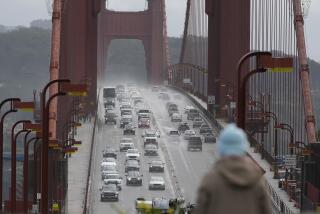Oregon considers mileage-based tax
- Share via
PORTLAND, ORE. — For years, Oregon has been diligent about reducing the state’s dependence on fossil fuels, but its environmental consciousness has come at a stunning price -- gas tax revenue is down $4.8 million a year compared with 2006.
That drop, caused by lower fuel consumption and a slowing economy, has prompted Oregon to consider a new way to pay for road repairs: Democratic Gov. Theodore R. Kulongoski’s upcoming budget calls for a highway tax based on mileage, not gasoline purchases.
A state task force will look at equipping every new vehicle in Oregon with a Global Positioning System to record every mile driven and where. Motorists would pay at the gas pump based on how much they drove, no matter how fuel-frugal their vehicle.
The plan still requires legislative endorsement and the full details could take several years to work out, but state analysts said the governor’s endorsement is a crucial step toward solving what has become a problem in many states: dependence on a gasoline tax.
“This is a way to try to develop a fair funding mechanism that we’re going to have to have if we’re going to be aggressive in terms of looking at electric cars and hybrids and plug-ins and all those options, and at the same time continue to invest in our roads and infrastructure,” said Rem Nivens, the governor’s deputy communications director.
Oregon plans to spend $650 million on transportation projects next year, a smaller version of President-elect Barack Obama’s proposal to stimulate the economy with infrastructure spending. Here, it will be financed in part by a 2-cent-a-gallon tax increase.
Jim Whitty, manager of the state transportation department’s office of innovative partnerships and alternative funding, said the state already faces a $10-billion shortfall in financing transportation projects, and the number will climb unless the decline in gas tax revenue is addressed.
Only a major rethinking of highway finance can keep Oregon from running seriously short of transportation funding as early as next year, state officials say.
While Oregon appears to be out in front in looking at a mileage fee, several other states, including Ohio, Pennsylvania, Colorado, Florida, Rhode Island, Minnesota and Texas, have also expressed an interest in phasing out the gas tax in favor of charging motorists for how much they drive.
In Oregon, some drivers protest that the plan would discriminate against rural residents who may have to drive several miles just to get to the grocery store; create potential inequities compared with drivers from out of state; and raise privacy concerns, with Big Brother keeping a satellite watch over where everyone is driving.
“What’s next? Tattoo numbers on your forearm?” wrote one commenter at Oregon Catalyst, a conservative website.
Jason Williams, executive director of the Taxpayer Assn. of Oregon, said: “This is just another wide-eyed government experiment that’s going to fail and cost the taxpayer a lot of money. We basically see it as the next big boondoggle of 2009.”
While the GPS mileage-counters could be programmed not to regularly report a vehicle’s location, that wouldn’t entirely eliminate privacy concerns, Williams said. “The fact that they tag your car to a certain place at a certain time means they’re tracking your movements. So what happens in a divorce court when the wife tries to track where her husband was, or a boss tries to make sure you were where you were supposed to be?”
Some Oregon businesses have been eager to take advantage of the state’s substantial tax credits for shifting to energy-efficient vehicles. The governor’s proposal to expand the tax credit for electric cars to up to $5,000, combined with new federal subsidies, could allow Oregonians to save up to $12,500 on the purchase of an all-electric car.
Portland’s Hot Lips Pizza already has converted five of its 14 delivery vehicles to all-electric, “and we’re looking at definitely increasing that number,” in part because some customers now specify that they want their pizza delivered in an electric car, said Lou Hijar, director of operations.
He said the company has not calculated how a mileage fee rather than a gas tax would affect its expenses, but is ready to look at the proposal. “We’re always looking for the better mousetrap,” he said.
State officials say they are committed to minimizing concerns about privacy and about inequity before implementing any mileage-based idea.
In a Portland trial program in 2006 and 2007, about 300 cars were equipped with GPS devices and every time drivers bought gas, they were charged 1.2 cents a mile -- about equivalent to the state’s 24-cents-a-gallon tax assuming a vehicle that averages 20 miles per gallon.
“They drive up to the pump and there’s a mileage reader there, very much like a modern toll reader, which identifies the car as a mileage fee payer, and the total mileage driven in each zone is transferred by a wireless radio frequency that goes into a database, and the mileage fee rates are applied,” Whitty said.
In Kulongoski’s proposal, GPS devices would be installed only in new vehicles, and would monitor mileage only on Oregon roads. Drivers from outside the state would pay the standard gas tax, Whitty said.
The monitors could also allow the state to charge higher fees for rush-hour travel in congested areas, Oregon officials say. Seattle recently conducted such a trial with GPS and found that drivers were much less likely to enter congested areas when charged to do so.
California has also looked at mileage fees, but “we’re still talking. We’re not there yet,” said Elizabeth Deakin, professor of city and regional planning at UC Berkeley.
She said the increasing variation in vehicles’ fuel efficiency has impelled the national debate over how to pay for transportation expenses.
“A vehicle that gets 20 mpg pays more gas tax, but doesn’t actually use that much more road than my hybrid does,” she said. “I’m not paying much gas tax. I’m getting kind of a free ride. Of course, you can say that’s not a bad thing, because it gave me an incentive to pay more money for the hybrid.”
Mileage fees don’t have to involve GPS trackers, Deakin said. They could be as simple as submitting periodic odometer readings -- when renewing car registration, for example -- or setting an estimated average that everyone would pay. (In the latter scenario, drivers could be invited to prove they drove less, and car sellers could be charged if their odometer readings were higher than they should be.)
Whitty acknowledged that he thinks Oregon “won’t be able to complete this without assistance from the federal government, or a consortium of other states,” because of such complications as the GPS cost to manufacturers for cars sold in Oregon; the likelihood that some Oregonians would just go out of state to buy cars without the GPS; and the potential inequity with drivers from out of state.
“We know what we need to do,” Whitty said.
“Now the other states have to decide whether they want to use our system or try their own.”
--
More to Read
Sign up for Essential California
The most important California stories and recommendations in your inbox every morning.
You may occasionally receive promotional content from the Los Angeles Times.













